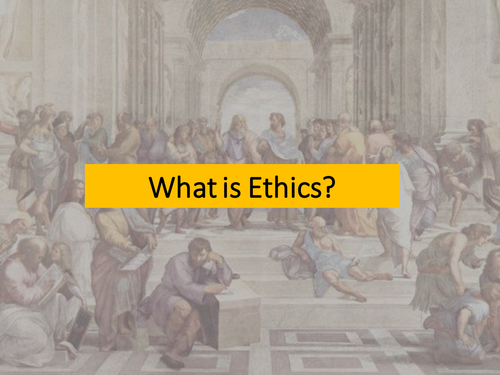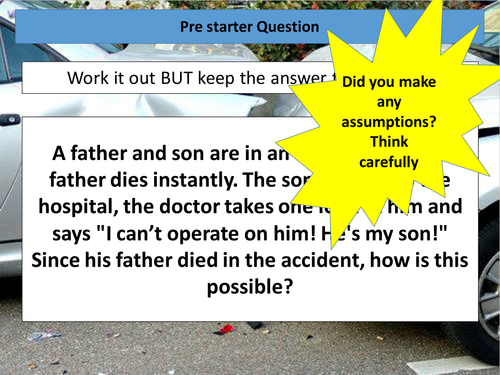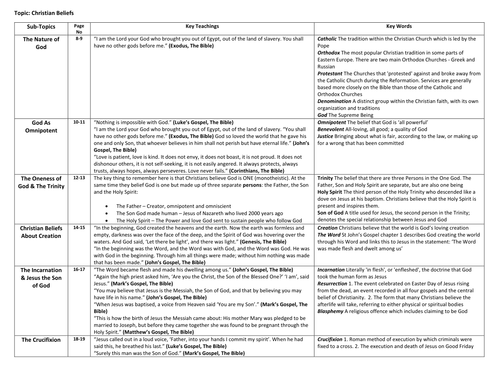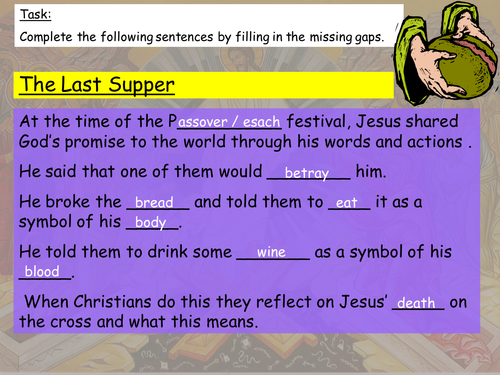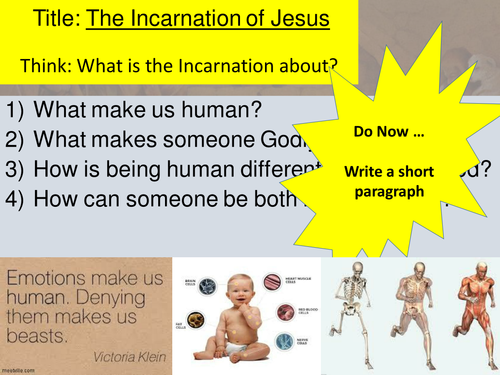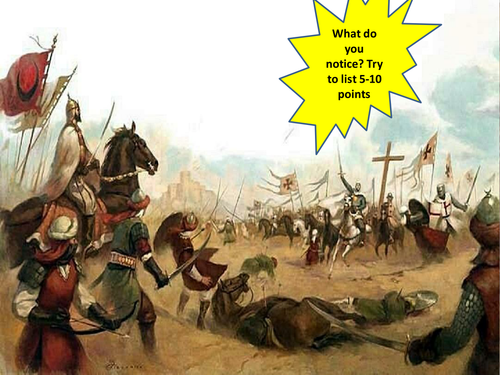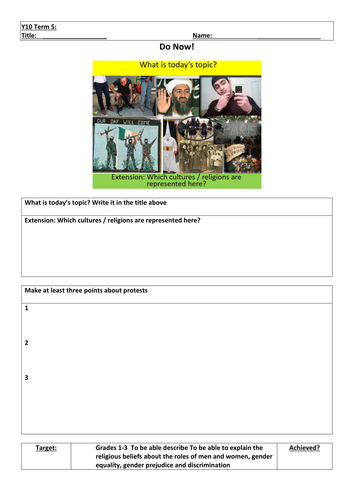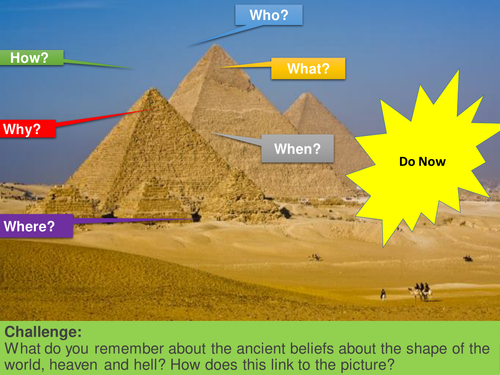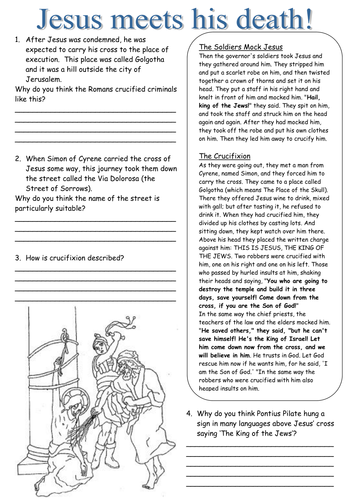
65Uploads
32k+Views
22k+Downloads
Religious education

What Is Ethics? A Level Taster Lesson
The lesson is designed to provide a rapid introduction to the purpose and value of ethics then focus on Utilitarianism, Natural Law Theory, Kant and Christian Ethics. The lesson revolves around seven dilemmas which are the foci for beginning to apply the theory. The lesson is framed by a grid which prompts the students to consider their views about religion and God. Clips are provided making links to Stephen Fry (atheism) and Indecent Proposal (situationism). Further research is suggested – chapter 1, Sophie’s World (Jostein Gaarder) and the death of Savita Halappanavar.

AQA Religious Studies 9-1 GCSE Gender Equality
The resources included are a ppt and a word doc. The ppt presents a variety of information, stimulus questions for discussion, examples of gender inequality, key words / terms for the topic, Christian and Muslim teachings and a 12 mark practice question to ensure students are able to practise grades 7-9 evaluation. The word doc fully supports all students in making notes and keeping all their learning organized.

AQA Religious Studies 9-1 GCSE Knowledge Organisers Revision
Two side summary of all key words and teachings for the whole course: Christianity (Beliefs & Practices), Islam (Beliefs & Practices), Relationships & Families, Religion & Life, Peace & Conflict, Crime & Punishment. Each organizer is designed as a two-side of A4 summary with headings: Sub-Topics, Page No (in the textbook), Key Teachings and Key Words. I'm finding the sheer amount of teachings and key words far exceeds that of the old GCSE and is key to repeated revision and being successful in the five and twelve mark questions.

New AQA Religious Studies Sacraments: The Eucharist
A ppt designed to explain the background to belief in the Eucharist. There is a student lesson template / worksheet to enable easy access to the lesson and note-taking. One activity will require access to the textbook.

The Incarnation of Jesus, The Son of God
A ppt to help teach the Christian doctrine of the Incarnation aiming to tease out some of the mystery of the divine and human features of this belief.

Religion, Crime & Punishment AQA Religious Studies 9-1 GCSE Seven lesson plans for Theme E
Seven lesson plans for Theme E Religion, Crime & Punishment AQA Religious Studies 9-1 GCSE. Lessons include, Crime & Punishment, Reasons for Crime, Religious Attitudes to Lawbreakers, The Three Aims of Punishment, Religious Attitudes to Treatment of Criminals (Prison, Corporal Punishment & Community Service), Religious Attitudes to Forgiveness and Religious Attitudes to the Death Penalty. Each lesson plan consists of a powerpoint and a word document. The latter is designed to ensure all students / all abilities are supported / stretched. All page numbers refer to the new spec textbook from AQA.

AQA Religious Studies 9-1 GCSE Holy War
This lesson attempts to teach most of the topic in about an hour. It begins with a question about whether religion is a cause of war at all. Aspects deal with key words and scripture. The main focus is on Islam but Christianity is included when comparing religious attitudes to Holy Wars. Further focus is given to how war should be fought, how war should end and Islamic Just War theory. A homework is set with a choice of tasks and exam questions set at different levels of challenge. All of the learning is supported by a word doc template for students to make notes and use as a 'safety net'.

AQA Religious Studies 9-1 GCSE Nuclear War and Weapons of Mass Destruction
This lesson includes a ppt and word doc to support students to make notes without facing a blank page! The lesson focuses on relevant Christian teachings and relevant key words. The lesson then proceeds to focus on the atomic bomb and the options that were available to America and the Allies in 1945. The main task is a clearly scripted plan for the students to debate the 'nuclear option'. A exam practice question is also included.

Feeding of the Five Thousand KS2 Assembly
This assembly focuses on the value ‘service’. It begins with a series of questions challenging the children to think about how well they ‘share’. The assembly moves on to the story of the Feeding of the Five Thousand. A script is prepared for children to read in three parts. The assembly ends with children being challenged: Nothing is too small to be shared. Whatever we have to share can make a difference to those around us. Nothing is too small to be shared with others. Ask each of these questions in turn, giving the children time to consider their response. As always, the assembly begins and ends with a words and prayers to be led by the children.
Bundle

New AQA Religious Studies 13 Lessons plus resources
Powerpoints and word documents to fully support students studying the New AQA course. These lessons have taken a lot of time to produce and have been extremely useful to colleagues and me in the classroom. Students much prefer the lesson templates than blank paper and I believe progress is quicker as a result.
Bundle

AQA Religious Studies Islam Beliefs & Teachings
Seven lessons comprised of powerpoints and students' resources specially designed to work alongside the lesson - to encourage, improve pace and fully support the class!

AQA Religious Studies 9-1 GCSE Violent Protest & Terrorism
The resources included are a ppt and a word doc. The ppt presents a variety of information, stimulus questions for discussion, multiple examples of terrorist attacks, key words / terms for the topic, Christian and Muslim teachings and exam practice questions to ensure students are able to practise grades 7-9 evaluation. The word doc fully supports all students in making notes and keeping all their learning organized.

Sexual Relationships Before & Outside of Marriage
New AQA Religious Studies 9-1 GCSE lesson Sexual Relationships Before & Outside of Marriage. Powerpoint and word doc to fully support students in accessing this topic. Suitable for all abilities. Homework included.

Princess Diana & Service KS2 Assembly
This is another assembly promoting the theme of service. The assembly begins with a picture of Diana when she was a girl, then moves on to tell the story of her life. The challenge comes towards the end: Lots of people think that success means being rich and famous, but having these things may not result in happiness. Some qualities – care, kindness and friendship – can bring us more satisfaction and joy than we might expect and they cannot be bought. How can we show care, kindness and friendship in our lives? As always, the assembly is topped and tailed with words and prayers which can be led by the children.

New AQA Religious Studies How to Interpret The Resurrection & Ascension
A lesson ppt and word doc designed to prompt ideas about how to interpret / understand Christian belief in the Resurrection and Ascension.

The Journey Christmas KS2 Assembly
An assembly which uses the them of the John Lewis Christmas Advert 2012 The Journey. Explain that the advert is entitled ‘The Journey’. Invite the school community to discuss the storyline. Ask: ‘What does it tell us about care and giving?’ Observe that whether we are buying or making a Christmas gift, or simply helping a friend, it costs time and trouble to show that we care. Discuss how the Christmas story might also be entitled ‘The Journey’. It tells of Mary and Joseph’s journey into the unknown to bring the world the gift of Jesus. How did they feel? Wise men also faced difficulties and dangers on their long adventure to present their gifts. Why did they travel so far? In conclusion, refer to a story telling how a boy in Africa gave his teacher a Christmas gift. It was a beautiful seashell. “Where did you get this?” she asked. The boy explained that he had walked to a far-off beach to find it. Amazed and surprised, the teacher said: “You shouldn’t have gone so far just to find a present for me.” The boy smiled. He replied: “The long walk is part of the present.”
Play the advert again. The children really enjoyed it! Hopefully this will save you time!

St Andrew KS2 Assembly for 30th November
St Andrew Assembly/Collective Worship for 30th November. The assembly begins with identifying flags and patron saints for England, Scotland and Wales. Where is Scotland? Famous themes from Scotland. Things we know about Andrew from the Gospel: We first hear of Andrew when he was called by Jesus when he was busy fishing.He was there when Jesus fed the 5000 with 5 loaves and two fishes. Andrew was the disciple who spoke to the boy who had the 5 loaves and two fishes. He told the story of Jesus a long way from his home. He went to Poland, Russia and Greece to tell the story of Jesus! Andrew died in Greece on an X shaped cross. Many years after his death his bones were very precious to Christians who prayed to Andrew in heaven. The bones were brought to Scotland on a very rough sea. The place where they landed is known as St Andrew. Watch clip.
Mission for the children: Andrew believed that Jesus was good news for other people, so he shared that news.
Ask the children to consider whether the things that they say to others cause joy and happiness. Too often, we can say unkind things or use our words to make people sad. Wouldn’t it be amazing if we could all make people happy with the things that we say? Ask the children whether they have any good news today. You may wish to ask a few children to share their good news with other people.
Bundle

AQA Religious Studies 9-1 GCSE 6 Lessons Topic Peace & Conflict
Six Lessons Topic Peace & Conflict Each lesson is comprised of a ppt which is ready to teach plus a word doc which acts as a template for students to make notes and use as a 'safety net'. These lessons include key words and teachings and are guided buy the content in the textbook.

New AQA Religious Studies The Crucifixion
A ppt and lesson template to support students of various abilities access this topic.

Diwali KS2 Assembly / Collective Worship
The assembly is topped and tailed with a script for pupils (worship team) introducing and concluding the assembly. (All my assemblies follow this consistent format.) The assembly begins with a definition of Diwa: One Diva lamp; a row of lights is ‘Diwali’. Preparations include: Families clean their homes, Special food and sweets are enjoyed, Fireworks are often part of the celebrations. Revise what we know about Rangoli Patterns. A link to the story of Rama & Sita. The goddess of wealth, fortune, power, beauty, fertility and prosperity. Make the point that Hindus celebrate and decorate to ‘invite’ and make Lakshmi welcome. This belief is linked to the preparation and hope for a more prosperous new year!

